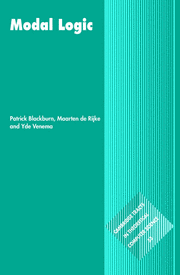Book contents
- Frontmatter
- Dedication
- Contents
- Preface
- 1 Basic Concepts
- 2 Models
- 3 Frames
- 4 Completeness
- 5 Algebras and General Frames
- 6 Computability and Complexity
- 7 Extended Modal Logic
- Appendix A A Logical Toolkit
- Appendix B An Algebraic Toolkit
- Appendix C A Computational Toolkit
- Appendix D A Guide to the Literature
- References
- List of Notation
- Index
2 - Models
Published online by Cambridge University Press: 05 July 2014
- Frontmatter
- Dedication
- Contents
- Preface
- 1 Basic Concepts
- 2 Models
- 3 Frames
- 4 Completeness
- 5 Algebras and General Frames
- 6 Computability and Complexity
- 7 Extended Modal Logic
- Appendix A A Logical Toolkit
- Appendix B An Algebraic Toolkit
- Appendix C A Computational Toolkit
- Appendix D A Guide to the Literature
- References
- List of Notation
- Index
Summary
In Section 1.3 we defined what it means for a formula to be satisfied at a state in a model — but as yet we know virtually nothing about this fundamental semantic notion. What exactly can we say about models when we use modal languages to describe them? Which properties of models can modal languages express, and which lie beyond their reach?
In this chapter we examine such questions in detail. We introduce disjoint unions, generated submodels, bounded morphisms, and ultrafilter extensions, the ‘big four’ operations on models that leave modal satisfaction unaffected. We discuss two ways to obtain finite models and show that modal languages have the finite model property. Moreover, we define the standard translation of modal logic into first-order logic, thus opening the door to correspondence theory, the systematic study of the relationship between modal and classical logic. All this material plays a fundamental role in later work; indeed, the basic track sections in this chapter are among the most important in the book.
But the central concept of the chapter is that of a bisimulation between two models. Bisimulations reflect, in a particularly simple and direct way, the locality of the modal satisfaction definition. We introduce them early on, and they gradually come to dominate our discussion. By the end of the chapter we will have a good understanding of modal expressivity over models, and the most interesting results all hinge on bisimulations.
- Type
- Chapter
- Information
- Modal Logic , pp. 50 - 122Publisher: Cambridge University PressPrint publication year: 2001
- 1
- Cited by

